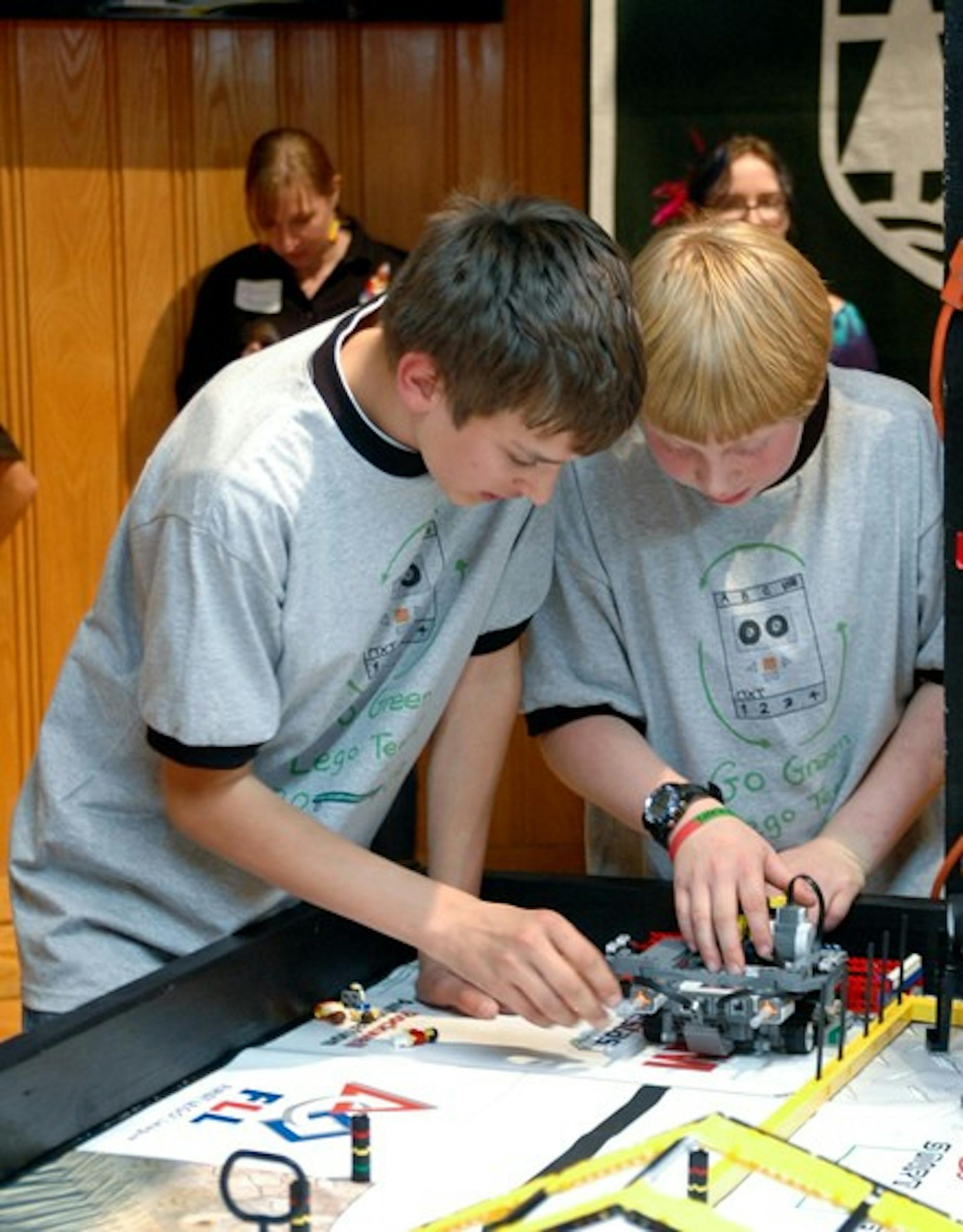The tournament, which was hosted by the Dartmouth Lego League, drew more than 45 Dartmouth and Thayer students, as well as community volunteers.
The Dartmouth Lego League is a branch of the international organization FIRST, "For Inspiration and Recognition of Science and Technology," founded by Segway inventor Dean Kamen. Kamen hoped to foster public appreciation for the "brainy instead of brawny" through FIRST, co-organizer Caitlin Johnson '10 said.
"He wanted scientists to be as popular as sports stars," Carl Hurd, who acted as a judge, said.
A resident of Springfield, Vt., Hurd has been involved with FIRST for nine years.
Four of the state tournament spots were awarded to teams that won first-place prizes in specific categories robot performance, technical design, teamwork and presentation of a research project. Each team's Lego robot, designed to accomplish as many of a series of predetermined tasks as possible in two and a half minutes, accounted for 25 percent of its overall score, Vonderhaar said.
Teams were also required to complete a research project related to this year's theme, "Smart Move," about a transportation issue in their community, she said.
Team "RoboSquids," which won the award for the best research project, examined the problems associated with jaywalking in Hanover, she said.
In addition to a research project and robot, competitors were judged on the completion of a teamwork activity building a bridge out of gumdrops and their responses to questions about teamwork and problem-solving, Vonderhaar said.
First and second place winners of the Champion Award given for excellent performance in all four areas of the competition, as well as a demonstration of gracious professionalism went to "Sasquatch" and "Gigabotz," respectively, allowing each to compete in the state tournament.
"We overhauled the robot every week," said James Wolfe, an elementary school student from Charlestown, N.H., and a member of the winning Sasquatch team. "It's nothing like we'd envisioned at the beginning of the season."
For Wolfe and many other competitors, robotics is a family affair. His younger brother, Timothy Wolfe, accompanied the team to the tournament and said he cannot wait to join Sasquatch next year.
Dartmouth students also said they enjoyed the competition.
"Being here is so exhilarating it pumps me up, and I love the kids," said Johnson, an engineering major and physics minor who co-founded the inaugural Dartmouth Lego League Robotics Tournament last year.
Johnson described the Lego League tournament as a "sporting event for smart kids," complete with a healthy competitive spirit, enthusiastic parent coaches and energetic teamwork.
Kristen Lurie '08 first brought the Lego League to the College when she started an all-girls team in Lebanon, N.H., Johnson said. When Lurie graduated, she asked Johnson to take charge of the program.
Johnson and Phil Wagner '09 decided to expand the program, applying for the national Albert Schweitzer Fellowship for community service to host a full-scale robotics tournament at the Thayer School. Last year's tournament was "the most fun day of my life," Johnson said.
Clad in matching Lego-adorned vests and various other pieces of flair, Johnson and Vonderhaar said they worked well as a team. The tournament went more smoothly and was more organized this year, Johnson said.
This year's event involved more volunteers from different sectors of the community, including local high school students and town residents, Johnson said. The diversity of volunteers helped to bring the College together with the local community, she said.
Johnson said her interaction with the town, and particularly with local children, is one of greatest benefits of the Lego League program.
"It's nice getting to know people in the local community," she said. "It keeps me going."
Johnson said the chance to connect with people outside of the 18-to-22 year age bubble inherent in college life, and particularly to "get kids interested in science early," sparked her interest in the program.
Vonderhaar, a biology major, said she hopes the interest in robotics that the tournament instills in Upper Valley children will inspire them to continue to explore the sciences.
The Lego League tournament is beneficial for students as a collaborative, rather than competitive, experience, Johnson and Vonderhaar said.
"It's a celebration of how far we've come," Vonderhaar said. "It's not about beating someone it's about learning and having a great time."




